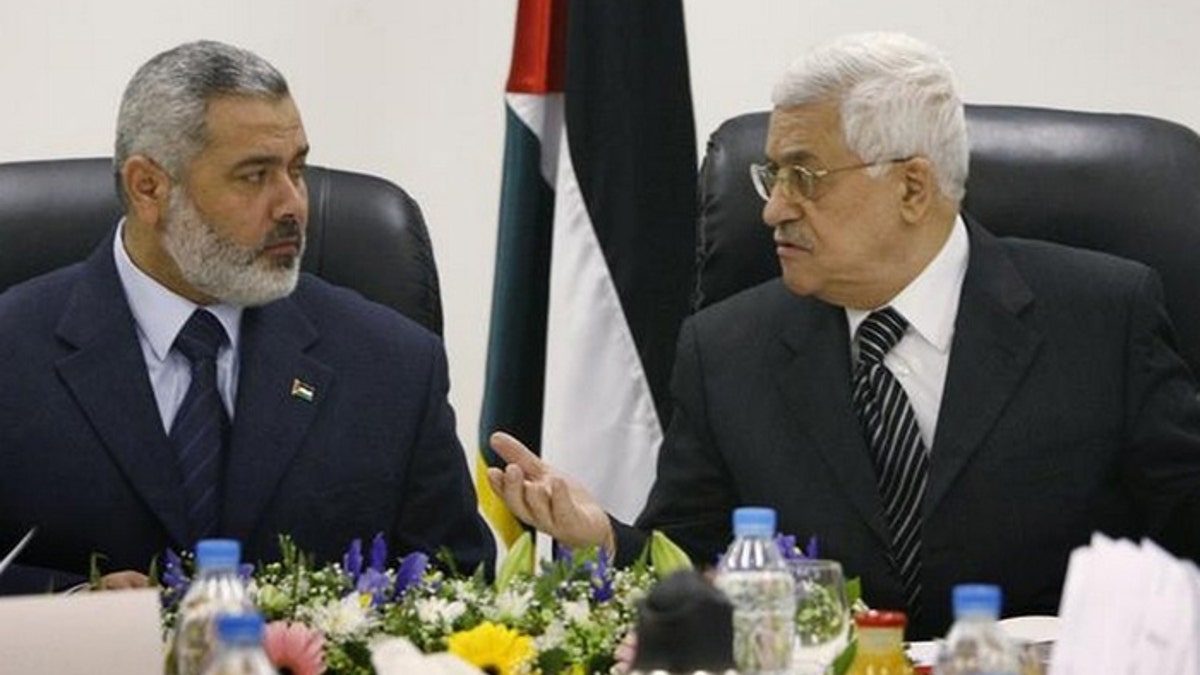
Palestinian Authority President Mahmoud Abbas (r.) talks with Hamas leader Ismail Haniyeh. (Reuters)
Top Palestinian Authority officials are appealing to Saudi Arabia to use an "iron hand" toward Iranian-backed rival Hamas, a development that underscores the ill will within the so-called unity government and could become the latest front for the proxy war between the Middle East powers.
With the Saudis indirectly engaging Iran in Yemen, where the Kingdom is trying to help the government put down the rebellion by the Iranian-supported Houthis, PA officials are asking the Saudis to do the same to Hamas. The PA, which claims to represent all Palestinians, governs the West Bank, while Hamas controls Gaza. The uneasy alliance between the two has degenerated into rancor in recent months, especially after Hamas declared in November that their unity government had ended.
“You are watching a tug of war between the two sides for the soul of the Palestinian people.”
“The Arab nation has to attack any illegal side in the Arab region with an iron hand,” Mahmoud Al-Habbash, religious advisor and close confidante of PA President Mahmoud Abbas, told worshippers in Ramallah recently. “It has to start from Palestine,” said Al-Habbash, adding that Hamas “must be attacked with an iron hand.”
Khaled Abu Toameh, of the Gatestone Institute, said there is irony in PA's call.
“The Palestinian Authority is calling on Arab countries to launch a military strike against the Gaza Strip -- even as the PA plans to bring "war crimes" charges against Israel for doing exactly the same thing in the summer of 2014,” Toameh said.
Any remaining public veneer of cooperation between the two sides fell apart this weekend as Hamas hit back, calling for Abbas to “quit the political scene,” citing his “personal intransigence and total refusal to share powers.”
Both parties are under considerable pressure at the moment. Hamas, whose repeated cross-border missile attacks into Israel and terror tunnel infrastructure prompted a devastating 50-day war last summer - has seen the billions of dollars of aid pledged by the Arab world for rebuilding Gaza fail to materialize. Its clandestine supply tunnels from Egyptian-controlled Sinai into the Strip have also been decimated and remain mostly locked down. Egypt, which is allied with Saudi Arabia in the Yemen effort, is also a staunch supporter of the Palestinian Authority.
Despite being at odds with Egypt, Israel and the PA, Hamas has a reliable backer in Iran, which both before and since the signing of the nuclear deal in Lausanne last month has brazenly armed and financed the internationally designated terrorist organization, while doing the same for Hezbollah in Lebanon and Syria and, most recently, the Houthi rebels in Yemen.
“Iran has sent Hamas’s military wing tens of millions of dollars to help it rebuild the network of tunnels in Gaza,” Britain’s The Sunday Telegraph reported last week. “It is also funding new missile supplies to replenish stocks used to bombard residential neighborhoods in Israel during the war. The renewed funding is a sign that the two old allies are putting behind them a rift caused by the conflict in Syria, where Shia Iran is backing President Bashar al-Assad against Hamas’s mainly Sunni allies.”
The Fatah-led Palestinian Authority, based in the West Bank, is also broke and has long been well aware of Hamas’ attempts to undermine its power. The bitter in-fighting between the broadly secular Palestinian Authority and the Islamist Hamas stretches back over 20 years. It includes the hotly contested Gaza elections of 2006, which were won by Hamas – no elections have been held since - and which a year later prompted a violent purge by Hamas of Fatah supporters in Gaza that effectively led to a brief period of civil war.
The adversarial relationship between the two Palestinian groups is not new, but it may be reaching a boiling point, especially if both sides call in their benefactors, Iran and Saudi Arabia. Caught in the middle will be the mostly poor Palestinians who the PA and Hamas seek to govern.
“The split between the two is irreconcilable," Jonathan Schanzer, vice president of research at the Washington-based Foundation for Defense of Democracies, told FoxNews.com “You are watching a tug of war between the two sides for the soul of the Palestinian people.”
